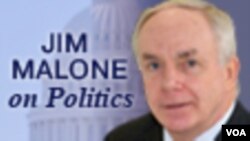Though still early in the 2016 presidential campaign, foreign policy issues such as countering Islamic State militants and negotiating a nuclear deal with Iran continue to dominate the debate among Republican White House contenders.
“No one, no one understands any longer whom America stands with or whom we stand against," implored New Jersey Governor Chris Christie during a visit to the early primary state of New Hampshire this week, where he made the case for a more active U.S. presence overseas. "No one understands exactly what we stand for and what we are willing to sacrifice to stand up for it.”
Christie, who is expected to announce his presidential intentions soon, is one of a more than a dozen Republicans who have either formally joined the 2016 race or are seriously considering a run.
Targeting Islamic State
During a recent Republican forum in the early contest state of Iowa, former Pennsylvania senator Rick Santorum offered his strategy for countering the Islamic State. “They want to bring back a seventh century version of Islam and so here’s my suggestion: We load up our bombers and bomb them back to the seventh century!”
South Carolina Republican Senator Lindsey Graham said he will announce his candidacy on June 1 and promised to make national security the focal point of his campaign.
Telling “CBS This Morning” he decided to run because “the world is falling apart,” he also told the Iowa forum that the threat of the Islamic State requires the deployment of U.S. ground forces.
“And I’ve got one simple goal," he added, "to make sure this war never comes back here again and that means some of us have got to go over there to fight.”
Paul’s contrarian view
But one Republican contender, Kentucky Senator Rand Paul, remains skeptical of U.S. military involvement overseas in the wake of the Iraq War. “Is there more chaos or less chaos? Is there more of the rise of radical Islam?" he asked. "Is ISIS more of a threat now because of the instability?”
Paul also said the recent focus on whether the current crop of Republican presidential contenders would have invaded Iraq, now knowing the intelligence was faulty, is a legitimate topic for debate.
Former Florida governor Jeb Bush, one of the Republican frontrunners, stumbled over the Iraq question last week before finally concluding that he would not have gone into Iraq given what he knows now.
“Who is going to take care of the Christians who were killed in Kenya only because they were at a university?" Bush said while pressing for a strong U.S. role overseas in remarks at the Iowa forum. "Who is going to take care of the Christian girls in northern Nigeria? But for us, who?”
Foreign policy or the economy?
The early Republican focus on foreign policy is unusual in a presidential campaign, says John Fortier of the Washington-based Bipartisan Policy Center.
“Often our elections are about domestic things even when important foreign policy issues are going on, [but] the world has been troubled in many ways and so it is hard to keep foreign policy off the stage," he said "Will that be a good thing for Hillary Clinton, who is quite experienced in foreign policy and yet has been in the mix on the [foreign policy] issues that will be potentially controversial? We will see.”
Democratic pollster Celinda Lake tells VOA that the 2016 race won't become a foreign policy election, saying voters will ultimately focus on the economy and their own prospects for the future.
“Americans are searching for a leader who understands the challenges that are out there and who has a clear economic message, and both parties have challenges and opportunities on the economy.”
So far, six Republicans have officially declared their candidacies. Among Democrats, only Clinton and Vermont Senator Bernie Sanders have declared.





